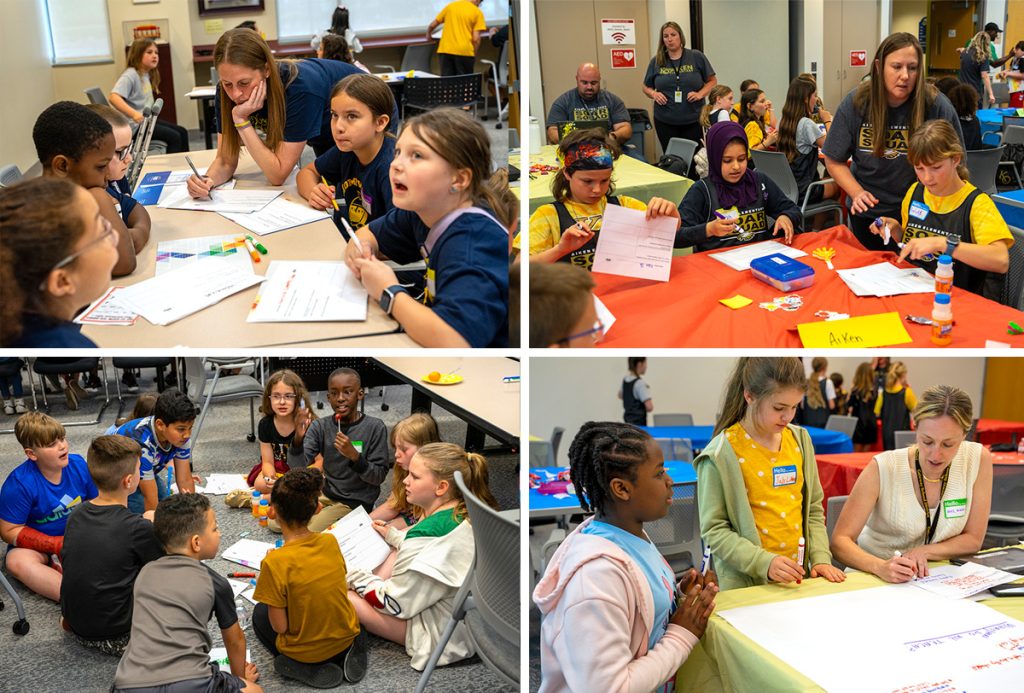
TaC Behavior Team Hosts Inaugural PBIS Elementary Student Summit
Teamwork makes the dream work — at least that was the hope for dozens of “superhero” students last spring as they brainstormed ways to make their schools better.
In May, the AIU Training & Consultation (TaC) team hosted nearly 80 students from seven elementary schools across four member districts at the inaugural PBIS Elementary Student Summit. PBIS, which stands for Positive Behavioral Interventions and Supports, is a framework designed to create a social culture and behavior supports needed to improve student outcomes.
Jacob Minsinger, Ed.D., an AIU behavior training and consultation coordinator, said one of the trademarks of the framework is creating student teams to help cultivate ideas to strengthen their schools’ positive behavior support system in their schools. Student teams are not mandatory, but they go a long way in promoting student buy-in. “We wanted to bring these schools from around the county together to brainstorm and share ideas and kind of celebrate the end of the year,” said Dr. Minsinger. “These teams have been working hard throughout the year to figure out what kinds of acknowledgements and rewards work for their schools.”
The TaC team set out to expand its reach to younger students after holding a student summit for secondary students earlier in the school year. The event kicked off with breakfast and icebreakers. Students chatted with one another to find out who liked sushi and who was wearing red to fill out a Bingo card and played a mega-game of “Rock, Paper, Scissors” to get to know each other. But despite the chaotic tendencies of 80 elementary students clamoring around the room, all it took was an adult to shout “Avengers!” for the students to settle in place and call back “Assemble!” That’s PBIS at work.
At Keystone Oaks’ Aiken Elementary, the “SOAR Squad” has been evolving for about three years. Principal Dave Thomas brought two teachers and about 18 fourth and fifth graders to the event. “Each year it gets better,” he said. “The younger students see the squad as role models, and our older students enjoy the responsibility of being positive examples.” Students in fourth and fifth grade apply at the end of each year to be a part of the squad, and the experience is something the students get excited about. “I like that I get to help little kids and encourage them when they don’t know how to do things,” said Gabrielle Lucas, a fourth grader at Aiken Elementary. “It’s pretty awesome.”
Part of the framework’s success in schools comes from not being a one-size-fits-all or pre-packaged curriculum. Schools have a lot of flexibility in how they implement the three tiers:
- Tier 1: Emphasizes teaching behavior expectations to all students, building a social culture where students expect, prompt, and reinforce appropriate behavior for each other
- Tier 2: Targets students who struggle with the program in a small group setting to increase their likelihood of success
- Tier 3: Focuses on intensive, individualized interventions for students who need more support
In the West Mifflin Area School District, teachers use all three tiers of the program, said Danielle Onuffer, a second-grade teacher at Homeville Elementary and one of the district’s PBIS coaches. She accompanied five third-graders who opted to miss their school’s “Fun Day” to attend the summit. Their enthusiasm was evident as they worked on posters demonstrating how they help encourage responsible and respectful behavior. “Having this program adds so much to the school’s culture by encouraging students to be positive and be leaders,” Onuffer said. “There was no hesitation for them—this is where they wanted to be.”
Written by Daveen Kurutz
Photos by Michael Tarquinio